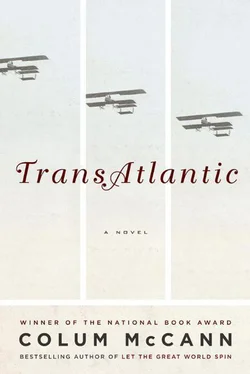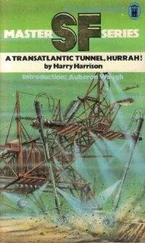I PULLED ON my wetsuit and went out the back door into the dark. The water came right up to the lawn. The low stone wall was green with slime. I zipped the wetboots tight and went down the slipway, waded in the high tide. Georgie barked on the shore and by the time I turned around she was already in the water. A reluctant swimmer, our Georgie, so it was all the more endearing that she paddled out, her brown eyes shining and just a little panicked. I must have looked quite a sight to her: the tight wetsuit, only the chub of my face visible along with a few gray hairs escaping from the side of the hood. I eased in. The small shock of cold, and then the lockdown of warmth.
To allay Georgie’s fears I stayed close to shore, floating on my back, looking up at the stars making their claw marks. As a boy Tomas loved the notion that the light hitting our eyes might be coming from a star that had already disappeared. For a period he studied the sky and all its complex configurations. He heard the Alcock and Brown story from his grandmother, and wanted to know what Brown might have known way back then to navigate the Atlantic. Flying on instinct and beauty and fear. It amazed him that Brown had flown without a gyroscope. Tomas took his boat out on the lough and charted the stars on graph paper. He brought a sextant with him, binoculars, a spirit level, an infrared flashlight. The occasional patrols on the lough shone their lights at him: the Coast Guard were well versed in our family’s habits, but the military units were miserable. Searchlights on their boats, they pulled up quick and sudden. Loud hailers. Parachute flares. He was petulant with them and gave them lip, until they figured out he was harmless enough, just a boy with an odd yearning, though once they tipped his boat over, and all his careful charts were ruined. In later years, in university dorms, he darkened his windows, painted the walls black, cut luminous stickers out to place on the ceiling, navigated from there. A solitary life.
After he was taken from us — it is still so hard to say murder— I found myself obsessing about whether or not Tomas had ever kissed a girl, until I met one he had apparently gone out with for a while, a vulgar little hussy who worked in an insurance office on the Ormeau Road. She cured my illusions of another life for him.
There are times when the past acquires a particular resonance and we grow sensitive to the noises normally beyond the range of hearing. Our Tomas was very much nourished by the tangled skein of connections. He sat with his grandmother in our house on the Malone Road and listened to her stories, and wanted at one stage to create a mathematical model of where he came from: Newfoundland, Holland, Norway, Belfast, London, St. Louis, Dublin. A zigzag line all the way back to Lily Duggan. I asked him what the diagram might look like and he thought about it for a moment and said that it could be something akin to a nest in a tree as seen against a background of high-speed cinematography. I had little idea what he meant at the time, though it strikes me now as intricately beautiful, the twigs taken from everywhere, bits and pieces, leaves and branches, crossing and crisscrossing, years of time lapse, Catholic, British, Protestant, Irish, atheist, American, Quaker, all the time the clouds dispersing in the shaped-out sky behind him.
Lord above, I miss my boy. Even more so as the years go by. At my most morose, I have to acknowledge that quite possibly the reason I put pen to paper is precisely because I have nobody left to whom I can tell the story. After Tomas died, Lawrence walked his tweeds towards another farm in Fermanagh, left the cottage to me. He left the guilt in the lough, said I would find my own way out, somehow. The truth of the matter is that the light at the end of the tunnel generally belongs to the pharmaceutical companies. There wasn’t much hope I could take, even in memory. Two generations of mothers were still alive when Tomas was taken from us. He was happiest of all with his grandmother. Nana, he called her. They sometimes sat on deckchairs on the edge of the lough. She used to say that she was younger than him, and perhaps in some ways she was. It sounds corny when I strike the nib of the pen against the page, but there are times I think the pendulum has reached the top of its arc.
I SWAM FOR the best part of an hour until every small part of me hurt with cold, then I waddled up the garden with Georgie in tow. I changed into every cardigan I have ever owned and walked, still shivering, to the kitchen. Georgie was shoved up tight against the Aga stove and I joined her, then made a feed of sausages and eggs and beans. She curled up at my feet while I sat at the table, and wiped my feet on moonlight on the floor.
TO GET MY senses back after a night of tossing and turning, I walked Georgie around the island in the cold snap of dawn. Or rather she walked me. My curlew was calling from the eastern pladdies. I was glad to hear her after so long. I used to think that her call was forlorn, but her return makes her so much more than a sound.
Georgie ambled alongside me among the tangle of old ropes and smashed oars and broken orange buoys washed in on the edge of the shore. The tide was returning and I cut up towards the mudflats, pulled myself along by holding on to the long reeds, unsettled a smoky muck from the bottom of the water. I sat still for several minutes, the better to absorb the landscape, or rather be absorbed by it.
When I crested the curve in the road my phone beeped. Somehow the bank had gotten a hold of the number of my BlackBerry. There were two new messages waiting. Very polite. The suitors to my genteel poverty. The little red light pulsed in my pocket. I erased them without even listening.
I turned the corner and looked at the cottage, low against the lough. It struck me there and then that if I didn’t do something quickly, I would not be able to do anything at all.
THE LAND ROVER started first time, ancient horse. Georgie climbed in the backseat, her muzzle to the glass. She needed a bath. I cracked the window. The clutch was tight and it took me a while, out the driveway, along past the pladdies, beyond the ruins, the four miles up to the village.
A handsome young man filled her with diesel and then returned my credit card with a slightly embarrassed shrug. He checked the tires and put in a liter of oil, put his finger to the front of a backwards baseball hat.
“No charge, Mrs. Carson,” he said. “That’s on us.”
He stuffed a rag into the pocket of his overalls, turned away. I called him back, closed his fingers around a single pound coin, and he blushed.
“Mind the road now.”
I pulled out in the light drizzle, my eyes hazy with gratitude.
Cars with their lights on in the middle of the morning blazed up behind me. I waved politely for them to go around me, then adjusted to a victory sign as more and more of them passed. Some of them even had the good humor to laugh. It took almost twenty minutes for me to get onto the main road, only narrowly avoiding a crash, which would have solved all my problems neatly.
I had to chuckle on the stretch near Comber when even a slow boat on a trailer passed me, the driver flashing her hazards.
The traffic in Bangor was backed up along the street. The town was bustling. Cars, lorries, delivery vans, bicycles. I hemmed the Land Rover into an illegal spot that demanded I should use a disabled sticker. The one I used for ferrying my mother back and forth was five years out of date, but I placed it up on the dashboard anyway.
I sat on the back bumper and changed from my Wellingtons into a good pair of shoes. I felt rather crusty in my old green hunting jacket, so I took it off and turned it inside out, draped it over my arm. I wore a cardigan and an old blue dress Lawrence had bought for me decades ago: the back of the dress had been let out several times so that it was a patchwork, but from the front it looked just fine, especially with the cardigan draped over it. I walked Georgie down High Street, her hair wild and unbrushed.
Читать дальше












